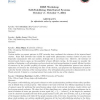27 search results - page 2 / 6 » Linear Time Byzantine Self-Stabilizing Clock Synchronization |
SSS
2005
Springer
14 years 1 months ago
2005
Springer
Awareness of the need for robustness in distributed systems increases as distributed systems become integral parts of day-to-day systems. Self-stabilizing while tolerating ongoing ...
EDCC
1999
Springer
13 years 12 months ago
1999
Springer
In this paper we present a new fault tolerant clock synchronization algorithm called the Fault Tolerant Daisy Chain algorithm. It is intended for internal clock synchronization of...
OPODIS
2004
13 years 9 months ago
2004
S (in alphabetic order by speaker surname) Speaker: Uri Abraham (Ben-Gurion University) Title: Self-Stabilizing TimeStamps : Speaker: Anish Arora (Ohio State) Title: Self-Stabilizi...
PODC
2012
ACM
11 years 10 months ago
2012
ACM
The goal of Byzantine Broadcast (BB) is to allow a set of fault-free nodes to agree on information that a source node wants to broadcast to them, in the presence of Byzantine faul...
INFOCOM
2002
IEEE
14 years 14 days ago
2002
IEEE
Abstract—Packet delay traces are important measurements for analyzing end-to-end performance and for designing traffic control algorithms in computer networks. Due to the fact t...


